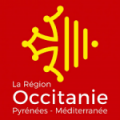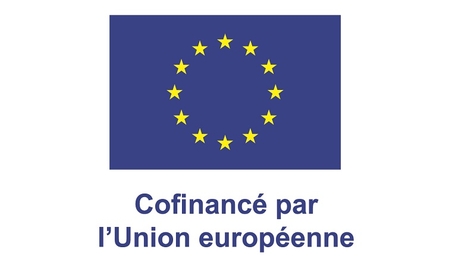The DILAMI program welcomes and assists exiles to integrate socially, academically and professionally. This training program promotes the development of linguistic and intercultural skills, up to B2 certification which is necessary for successful social and economic integration in France.
Since DILAMI was created in 2017, the program has welcomed sixty learners each year. Students qualifying for this program are asylum seekers, refugees, and beneficiaries of subsidiary or temporary protection. More than 300 exiles have been trained in the French language and culture, in the laws and values of citizenship, and have been supported on their educational and professional career path. Some of the students from this program have even acquired a diploma in French language studies (DELF - diploma delivered by the French Ministry of Education).
Led by the University of Toulouse, DILAMI is supported by the European Union's Asylum Migration and Integration Fund, the Occitania Region, and the Haute-Garonne Prefecture. DILAMI was created in response to the needs of exiles from the Middle East. This program joins other initiatives which began in 2015 within the French higher education system.
Degree courses
Initially, students had the status of ‘free auditor’ which allowed them to attend the course but not with official student status. However, starting in the academic year 2020-2021, this program became a University degree program (Diplômes Universitaires Passerelle (DU Passerelle DILAMI). This change of status was advocated by the organization MEnS - Migrants in Higher Education and approved by the Ministry of Research, Higher Education and Innovation (MESRI).
In September 2021, the Toulouse program entered a new phase. The DU became an inter-university degree program, the Passerelle Inter-University Diploma (DIU Passerelle DILAMI), thus realizing the co-awarding of these diplomas by the University of Toulouse and the following partner universities:
- DIU Passerelle DILAMI - A2, at the University Toulouse Capitole for the beginner level
- DIU Passerelle DILAMI - B1, at the University of Toulouse for the intermediate level
- DIU Passerelle DILAMI - B2, at the University Toulouse - Jean Jaurès for the advanced level
The Program
400 hours per year of French instruction as a foreign language (FLE)
Workshops intended for these students to :
assist them in orientation and integration at their University and on their professional career path, in collaboration with the SCUIO-IP (Services Communs d'Information, d'Orientation et d'Insertion Professionnelle) of 3 partnering universities, with conferences with those responsible for their education (IUT, BTS and AFPA), and ongoing exchanges with social and Pôle-Emploi (Employment) representatives.
- prepare them for life as a citizen in France (rights and duties, opening up to community life, etc.)
- introduce them to Toulouse's heritage and cultural life and to artistic expression: site visits, projects (exhibitions, theater, songs, circuses, etc.) in collaboration with the city's cultural associations.
- A project approach : Drawing from their studies, the students are asked to create a show including artistic work and reflections on citizenship. This event takes place twice a year.
Course requirements
Commitment to DILAMI requires regular attendance and punctuality in class as well as a significant amount of work outside of the classroom: 15 to 20 hours per week. DILAMI is an intensive and demanding course.
Organization of the courses
DIUP students have 12 weeks of training per semester. Classes are held every morning for 4 hours from Monday to Friday. One morning is reserved for cultural, orientation and citizenship workshops.
Evaluation of the course
Students are evaluated by continuous assessment and take exams at the end of each semester. They must obtain an overall average of 10 out of 20 or more to validate their DIU. At the end of the course, the language level will also be certified by the DELF (Diplôme d'études de Français - Diploma in French studies) from A2 to B2.
How to apply?
Applications will be open until March 14, 2025.
// No applications will be accepted after these dates //
> Please note: Applications are now closed!
Who can qualify?
All qualifying applicants:
- must prove that they have asylum seeker, refugee status or beneficent from subsidiary or temporary protection.
- Be of legal age and have a baccalaureate level or equivalent: i.e. high school diploma or university entrance certificate, which is required to enrol in a higher education institution,
- Live in Toulouse or its suburbs,
- Wish to begin or resume studies in Higher Education.
What are the steps for the application process?
1. Complete the application and provide a scanned version of all requested supporting documents:
- A passport photo
- A copy of a proof of identity card attesting to the applicant's current status: receipt of asylum application, a document recognizing international protection (refugee, beneficiary of subsidiary or temporary protection)
- A copy of the diploma equivalent to the baccalaureate or secondary school certificate translated into French by a sworn translator
- A copy of the highest university degree
- A certificate of diploma equivalence from ENIC-NARIC, showing the date of submission and the last follow-up notification
Attention! Requests for diploma equivalence can be made on the website of france-education-international.fr/reconnaisance des diplõmes (https://phoenix.france-education-international.fr/inscriptions/)
2. Make sure you are eligible for Crous grants and apply. Ask your social advisor about other possible financial aid that you qualify for.
3. If after examination of the application, the applicant meets the requirements of the DILAMI program, the candidates will receive an invitation for student interviews which will take place in June 2023. Motivation and French level will be evaluated during a 20 minute interview with one of the teachers from FLE (French as a foreign language) as well as a written expression evaluation lasting approximately 30 minutes.
After the interviews, the candidates will receive an email indicating whether or not they have been selected and those that are selected will be informed of the procedures for the beginning of the academic year.
*The migrant language reception system (DILAMI) is part of the success pathway dynamic (https://www.univ-toulouse.fr/des-formations-pour-tous/parcours-de-reuss…)
Starting September 2022, DILAMI will also:
Offer FLE courses at the beginner level.
In parallel with the DIUP DILAMI and to prepare for the arrival of many Ukrainians and displaced persons from Ukraine, the DILAMI program is offering French beginner level courses as a foreign language at the start of the academic year 2022-2023. These courses, which are not part of a diploma program, are given by a qualified FLE teacher and allow about thirty students to attain the A1 level.
The learners are divided into two distinct groups based on level:
- absolute beginners (A0) benefit from approximately 125 hours of classes per semester
- advanced beginners (A1) benefit from approximately 90 hours of classes per semester
- Classes take place in 3-hour sessions, three mornings per week for the advanced beginners group and two mornings per week for the absolute beginners group.
- The students are evaluated by continuous assessment and at the end of each semester.
- Upon completion, the DILAMI teaching team will give each student a certificate of completion as well as a report evaluating competence and skills acquired.
How to apply?
The selection criteria and application procedures for beginner level FLE courses are identical to those of the DIUP.
The DILAMI is :
- DIU Passerelle DILAMI
- 1 course over 2 semesters - 60 credits - From September to June
- 1 diploma: DIU Passerelle DILAMI
- 3 locations: University of Toulouse (A0-A1), UTC (level A2), UT (level B1), UT2J (level B2) FLE courses at beginner level with 324 instruction hours per year
Contact
dilami [at] univ-toulouse.fr
Telephone : +33(0)5 61 14 80 23


The DILAMI program allows its enrolled students to undertake or resume their studies and to better integrate into French society.
It is co-financed by the Occitanie Region through the FAMI AIMES+ a grants from the European Union.